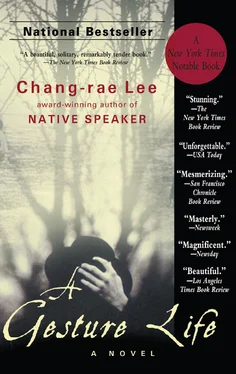I bowed curtly and the colonel acknowledged me with a grunt. I waited while he ascended the low porch and went inside. As I started back for my own tent, I could hear him speaking again, in a calm, unagitated tone, the same way he had spoken to the one of them who had hidden beneath the house. “Look at my girls,” I heard him saying, repeating himself slowly, like a father who has been away much too long. “Look here at my girls.”
BY MID-MORNING the day was already muggy and bright. I hadn’t gone in search of Corporal Endo the night before, nor did I have any interest in doing so amid the usual early bustle of the day. No one knew he had instigated the shooting, or that he had even been present, and when it was announced that patrols would be increased to prevent further sniping, I hoped he would keep quiet and let the event pass. Colonel Ishii, whom I saw during the morning exercise, seemed fresh and fit. I had not confided in anyone, for there was no one to confide in. But in truth I was more than just annoyed with the corporal. In fact I felt sure my association with him — and indeed, my continued tolerance — should come quickly to an end. I didn’t care about him, or perhaps closer to the truth was that I didn’t wish to care about him any longer. He had plumbed the limits of my patience, and I was sure I should be done with him.
I was also aware that a half-humorous notion about me had begun circulating about the camp. It was not so awful, but embarrassing all the same; namely, it was being joked that I was intending to become a professional mental therapist or psychologist after the war, and that I was employing Corporal Endo as a “practice patient.” Of course I found the jest insulting, and to know my name was being snickered about the infantrymen’s tents, but it was particularly shaming when Captain Ono casually mentioned during an inspection of the ward that I might take an interest in one of the soldiers who had just come in from the front, who had not a scratch on his body but could no longer see or hear or speak. Captain Ono had effected all manner of examination on the man, and finally ended up restraining his arms and legs and beating him on the feet with a switch. But even this had not worked, for the man just moaned torturedly from his throat, as though he were drowning in the pain.
“Why don’t you sit with him awhile, Lieutenant,” he had said thickly after that, his brow crinkled. “Perhaps it’s only you who can reach him now.”
At the time I was almost sure the captain was being serious with me, and in fact I spent a quiet hour that evening at the man’s bedside, inspecting his stoic face for the least indication of sentience. It was soon thereafter I understood that the doctor had been teasing me, and I felt, for a moment, the sharp heat of anger and shame. I was a young man, yes, but one of some learning and modest position as a junior officer, and if it was true that I was trained in a military school, not having his kind of university pedigree, it still seemed somewhat unfair of the doctor to belittle me so before a ward of enlisted men. I tried not to give further quarter to the feeling. The doctor was highly skilled and noted throughout our theater of operations for his innovations in field surgery, and I hoped that I could learn from him techniques and procedures that my textbooks and manuals could only hint at, such as his preliminary forays into open-heart surgery. In this sense it could be said that I genuinely admired Captain Ono, even held him up as a model for my future career. I had known from the first moment I met him that he was a person of singular resolve and even hardness, particularly when it came to the disposition of what must always be for him the patent, terrible frailty of his patients and others under his care, but I assumed it was his necessary mode, his own way of focus and concentration.
So it was with the girls whose charge he had left to me. And they were left to me, just as the captain had instructed, immediately after the commander was finally done with them. In the afternoon, I was the one who ordered that they be housed temporarily in one of the barracks, displacing a handful of men for several nights. The final receiving house was nearly completed, being built by a crew of native tradesmen who were following specifications provided by Captain Ono. I was to oversee this as well, but there was little left to be done.
In fact, it was all but finished. The comfort house, which is how it was known, was a narrow structure with five not-quite-square doorways, each with a rod across the top for a sheet for privacy. The whole thing was perhaps as long as a large transport truck, ten or so meters. There were five compartments, of course, one for each of the girls; these were tiny, windowless rooms, no more than the space of one and a half tatami mats, not even wide enough for a tall man to lie across without bending his knees. In the middle of each space was a wide plank of wood, fashioned like a bench seat but meant for lying down on, with one’s feet as anchors on either side. At the other end, where the shoulders would be, the plank was widest, and then it narrowed again for the head, so that its shape was like the lid of a coffin. This is how they would receive the men. After their duties were over, they would sleep where they could in the compartment. They would take their meals with the older Japanese woman, who was already living in her own small tent behind the comfort house. She would prepare their food and keep hold of their visitors’ tickets and make sure they had enough of the things a young woman might need to keep herself in a minimally respectable way.
I alone was responsible for their health. Captain Ono had briefed me fully. Well-being aside, I was to make certain they could perform their duties for the men in the camp. The greatest challenge, of course, would be venereal disease. It was well known what an intractable problem this was in the first years of fighting, particularly in Manchuria, when it might happen that two of every three men were stricken and rendered useless for battle. In those initial years there had been houses of comfort set up by former prostitutes shipped in from Japan by Army-sanctioned merchants, and the infection rate was naturally high. Now that the comfort stations were run under military ordinances and the women not professionals but rather those who had unwittingly enlisted or been conscripted into the wartime women’s volunteer corps, to contribute and sacrifice as all did, the expectation was that the various diseases would be kept more or less in check. Certainly, it was now the men who were problematic, and there was stiff penalty and corporal punishment for anyone known to be infected and not seeking treatment. I had one of the sergeants announce final call for the camp in this regard, as I hoped to quarantine anyone who might infect a girl, who in turn would certainly transmit it back among the men many times over, but it was very close to the time of their visits and only two men came forward complaining of symptoms, both of whom were in the ward already.
I was also to examine the girls and state their fitness for their duties. I was surprised that Captain Ono had given me this responsibility, though of course he had already completed an exam for the personal sake of the commander. But as there were procedural considerations, it was up to me to ask the older woman, who was called Mrs. Matsui, to bring them to the examination and surgery room of the ward.
I had put on a doctor’s coat and was sitting at the desk with several folders of paperwork that needed completing for the Captain. I usually did this work for him, though it wasn’t part of my stated tasks, but that afternoon I found I had no real patience for it. The intense heat of the day seemed to bound and treble inside the room, and the stiff white coat was yet another layer atop my regular uniform. I hadn’t eaten anything yet that day, because of the sticking temperature and the crabbed feeling of an incipient illness, which I knew was due partly to my shock at events of the previous night, as well as the anticipation of this present moment, which should be nothing at all for an experienced medic but was unnerving all the same.
Читать дальше











![William Frith - John Leech, His Life and Work. Vol. 1 [of 2]](/books/747171/william-frith-john-leech-his-life-and-work-vol-thumb.webp)
![William Frith - John Leech, His Life and Work, Vol. 2 [of 2]](/books/748201/william-frith-john-leech-his-life-and-work-vol-thumb.webp)